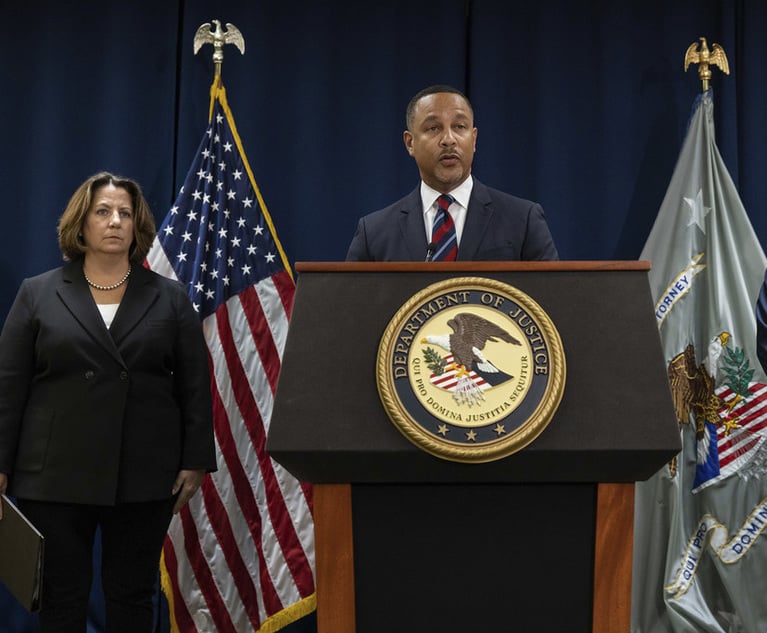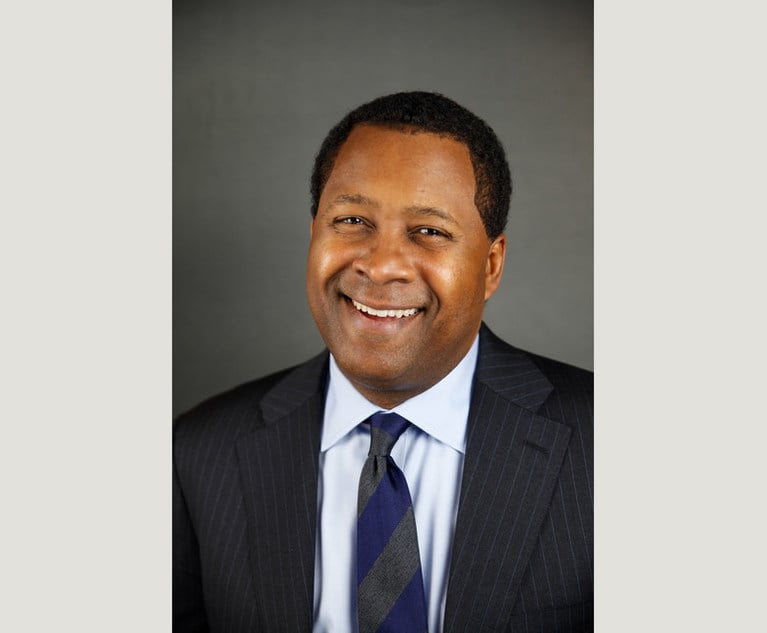Compliance Hot Spots: CFTC Officials Lawyer Up (With King & Spalding) | CFIUS Takeaways | Who Got the Work: PwC, Nissan Settle With SEC | A Rare Sullivan & Cromwell Lateral
Lawyers from King & Spalding are advising CFTC leaders as the agency comes under scrutiny in a Chicago court. Plus: early commentary on draft CFIUS rules. Scroll down for Who Got the Work. Thanks for reading!
September 24, 2019 at 09:00 PM
11 minute read
Welcome to Compliance Hot Spots, and good evening from Washington. The CFTC is taking a sealed appeal over a sanctions inquiry focused on the agency, and a team from King & Spalding is now advising commissioners and other officials. Plus: Early reactions to proposed CFIUS rules. Scroll down for Who Got the Work, and all the new moves, including a rare Sullivan & Cromwell lateral.
Tips, feedback and general thoughts on your practices are always appreciated. I'm C. Ryan Barber—reach me at [email protected] and 202-828-0315, or follow me on Twitter @cryanbarber. Thanks for reading! 
CFTC Leaders Lawyer Up With King & Spalding
A team from King & Spalding, including former U.S. attorney Zachary Fardon, is advising the leadership of the U.S. Commodity Futures Trading Commission as the agency comes under scrutiny over public statements about a settlement involving Kraft Food Groups Inc. and Mondelēz Global LLC.
Lawyers for Kraft and Mondelēz—represented by the firms Jenner & Block and Eversheds Sutherland—contend CFTC officials violated the terms of a $16 million settlement by making public statements that were not allowed. A provision of the deal limited what the CFTC could say publicly about it.
The defense lawyers are seeking unspecified sanctions, and U.S. District Judge John Robert Blakey has set an Oct. 2 evidentiary hearing.
Blakey's described the hearing as a civil matter, and remedies—if any punishment is imposed—could range from scrapping the settlement itself or perhaps initiating contempt proceedings.
CFTC lawyers have denied that public statements from commissioners—including Chairman Heath Tarbert, a former Allen & Overy partner—violated the consent order. Agency attorneys have described those statements as generalized comments about CFTC enforcement.
The King & Spalding team, which also includes Christopher O'Malley and Patrick Otlewski, on Tuesday asked Blakey to set a status conference in advance of the Oct. 2 hearing.
Meanwhile, the CFTC has filed a sealed appeal in the U.S. Court of Appeals for the Seventh Circuit challenging Blakey's orders initiating the sanctions investigation. The CFTC has taken down the disputed press statements as the sanctions inquiry plays out.
All of this litigation is remarkable, and we'll keep close eyes as the dispute unfolds in Chicago's federal trial court. 
Key Takeaways on New Draft CFIUS Rules
The new draft regulations for national security reviews of foreign investments in the United States issued by the U.S. Treasury Department contained some surprises, lawyers told my colleague MP McQueen.
The proposed rules governing review of foreign investments by the interagency Committee on Foreign Investment in the United States are tailored more narrowly than some initially had feared in the rulemaking process, but they also are more complex in some instances. There is a whole new regime that creates detailed rules about what types of real estate transactions are subject to CFIUS jurisdiction.
Under the rules, CFIUS has new jurisdiction over minority position, venture capital and private equity investments in critical technology, critical infrastructure and sensitive personal data. The new draft rules also cover acquisitions of property located near defense and national security installations.
>> "They opted for a very detailed approach where they saw specific national security concerns and as a result they have come up with a complex set of rules focused on those specific areas," said Christian Davis, an international trade partner at Akin Gump Strauss Hauer & Feld in Washington.
>> "In many ways, the proposed regulations reflect a somewhat unexpected, considered approach to addressing the issues of our day within the context of the traditional CFIUS regulatory framework," said Hogan Lovells global regulatory partner Anne Salladin in a statement.
>> "A lot of companies will be surprised that the government feels their data is sensitive for national security reasons," said David Hanke, a national security partner at Arent Fox in Washington. He said the proposed rules involving sensitive personal data put a premium on genetic information and companies that target or tailor services to U.S. military or national security agencies, as well as any company that maintains or collects data on more than 1 million individuals or has a business objective of doing so. 
Who Got The Work
>> Carlos Ghosn, the former CEO of Nissan, turned to Paul, Weiss, Rifkind, Wharton & Garrison partner Michael Gertzman and to resolve charges that he failed to disclose compensation he was set to be paid in retirement. The U.S. Securities and Exchange Commission alleged that, from 2009 until his November arrest in Japan on similar charges, Ghosn took part in a scheme to conceal more than $90 million in compensation. Ghosn agreed to pay a $1 million civil penalty and to a decade-long bar from serving as an officer or director of a publicly-traded company. Nissan—represented by Latham & Watkins partners Benjamin Naftalis (global vice chair of the firm's white-collar and investigations practice) and William Baker, and by Cleary Gottlieb Steen & Hamilton partner Matthew Solomon—paid a $15 million penalty as part of a settlement with the SEC. My colleague Phillip Bantz has more here at Law.com.
>> PricewaterhouseCoopers was represented by Davis, Polk & Wardwell partners Michael Flynn and Denis McInerney as the accounting firm resolved charges it violated auditor independence rules. PwC paid more than $7.9 million as part of a settlement with the SEC, which alleged that the firm provided prohibited services to several companies in the midst of audits. The alleged violations resulted from "breakdowns in PwC's independence-related quality controls," the SEC said. Financial Times has more here.
>> Paul Hastings LLP represented British Arab Commercial Bank PLC in its agreement to pay $4 million to resolve U.S. Treasury claims alleging violations of sanctions on Sudan. British Arab did not admit or deny the allegations. "British Arab Commercial Bank is very pleased with the resolution of this matter," Paul Hastings white-collar partner Kwame Manley in Washington told The Wall Street Journal.
>> White & Case counsel Matthew Leddicotte has joined the team representing VEB.RF, the Russian state development corporation. The firm disclosed its work under the Foreign Agents Registration Act, saying it "may conduct meetings with US government sanctions authorities on behalf of VEB.RF regarding potential new sanctions legislation that could affect the activities of VEB.RF." White & Case lawyers Carolyn Lamm, Nicole Erb and Scott Hershman earlier registered to advocate for the bank
>> Bell-Carter Foods, a leading oliver producer in the U.S., hired a team at Akin Gump Strauss Hauer & Feld to lobby on proposed tariffs. The Akin Gump team includes Casey Higgins, a onetime aide to former House Speaker Paul Ryan, and Josh Teitelbaum, who served under the Obama administration as a deputy assistant secretary of commerce. 
Compliance Reading Corner
Trump administration
CFPB Just Told SCOTUS It's Unconstitutional. What Does That Mean for Its Mission? Kathy Kraninger (above), director of the Consumer Financial Protection Bureau, is now backing efforts that critics contend could undercut the independence of the single-director agency. Alison Frankel over at Reuters writes: "There are two separate issues in play for the CFPB: Can the bureau really act as an enforcer when its lone director—who is ultimately responsible for all of the bureau's decisions—has acknowledged that she believes she was appointed under an unconstitutional provision? And if the Supreme Court ultimately agrees with DOJ and the CFPB that Congress stepped on the president's toes by insulating the CFPB director, what's the proper remedy?" [Reuters]
At 10,000 and Counting, This Company Is Flooding the U.S. With Tariff Appeals. "Companies have taken different approaches to the exclusion process. Some have filed only for a few key items. Others have filed single applications that cover many products, especially if those items all fall under the same 10-digit code in the tariff schedule. Trade attorneys and experts have said it isn't clear which tack is more effective. 'If I had figured out the secret recipe that explains approvals, I'd be speaking from the beach,' said Ted Murphy, a partner in the international trade practice at Sidley Austin LLP." [WSJ]
In the Decade Since Madoff, Ponzi Schemers Try New Tactics. "The S.E.C.'s enforcement announcements demonstrate how scammers' offerings have evolved to take in people … who might otherwise be wary of a pitch involving traditional investment funds. Half the 291 cases brought in the past decade involved schemes promoting untraditional products. In the decade before the Madoff case, about 38 percent did." [NYT]
Law firm practices
Brownstein Forms Crisis Management Practice Group With Ample DC Footprint. Brownstein Hyatt Farber Schreck has created a new crisis management practice group consisting of "veterans from the communications battlefield" with experience across the legal, government relations and public relations industries. The new practice will be led by shareholder Mitch Langberg, based in Las Vegas and California, and chief culture and communications officer Lara Day. [NLJ]
How International Turmoil Has Fueled Growth at Global Firms. Regulatory practices are especially strong of late, and as long as the economic downturn many firms anticipate doesn't become a deep global recession, they expect that growth to continue. In practices as wide-ranging as international trade policy, national security, antitrust and government contracts and investigations, firms are seeing a silver lining in the global turmoil, my colleague MP McQueen writes. [The American Lawyer]
Data privacy
Companies Face Uncertainty Over Challenges to Trans-Atlantic Data Transfers. "Companies that move personal data from the European Union to the U.S. must prove they handle the information securely and can choose from a handful of legal mechanisms to support such transfers. But court decisions expected in the coming months could force businesses to find other legal cover."[WSJ] 
Notable Moves & More
• Vinson & Elkins said it added Palmina Fava as a partner in the government investigations and white-collar practice in New York. Fava joins from Paul Hastings, where she co-chaired the global compliance and disputes department.
• Winston & Strawn has added Pamela Davis, a former Orrick, Herrington & Sutcliffe partner who specializes in matters related to the Foreign Corrupt Practices Act, to its San Francisco office. Prior to joining Winston, Davis served as co-director of Hui Chen Ethics Consulting, where she worked with alongside Hui Chen, the DOJ's first FCPA compliance counsel, working with clients on FCPA matters. Before that, she was with Orrick for more than 13 years.
• Steptoe & Johnson LLP has added Michael Bromwich, a former prosecutor and senior federal official who represented Justice Brett Kavanaugh's accuser Christine Blasey Ford before the U.S. Senate last year.
 • Marcella Burke (at left) has joined King & Spalding as a partner in the firm's government matters practice in Washington. She was most recently senior counselor and deputy solicitor at the Interior Department, after serving as deputy general counsel at the U.S. Environmental Protection Agency from 2017 to 2018. Burke said she would divide her practice between D.C. and Houston. "There is a lot of good work being done in sustainable and responsible energy development, and I plan to remain in the forefront," she said.
• Marcella Burke (at left) has joined King & Spalding as a partner in the firm's government matters practice in Washington. She was most recently senior counselor and deputy solicitor at the Interior Department, after serving as deputy general counsel at the U.S. Environmental Protection Agency from 2017 to 2018. Burke said she would divide her practice between D.C. and Houston. "There is a lot of good work being done in sustainable and responsible energy development, and I plan to remain in the forefront," she said.
• Reed Smith has hired Liza Craig as of counsel in Washington in the global regulatory enforcement group. Craig formerly was senior associate counsel with the Department of the Navy office of the general counsel.
• Former King & Spalding partner Gilbert Kaplan has resigned from the U.S. Commerce Department, Politico reports. It's unclear what motivated Kaplan's departure. King & Spalding recently rehired Stephen Vaughn, former Trump-era general counsel to the U.S. Trade Representative.
 • Sharon Cohen Levin (at left), who for decades led the asset forfeiture and money laundering unit at the U.S. Attorney's Office in Manhattan before heading to Wilmer Cutler Pickering Hale and Dorr in 2015, has moved to Sullivan & Cromwell. The firm said Levin provides anti-money laundering and forfeiture advice to corporate clients. Levin was once dubbed the "Babe Ruth of forfeiture" by a colleague. In her time at Wilmer, Levin was involved in one of the biggest money-laundering and asset forfeiture cases in recent years.
• Sharon Cohen Levin (at left), who for decades led the asset forfeiture and money laundering unit at the U.S. Attorney's Office in Manhattan before heading to Wilmer Cutler Pickering Hale and Dorr in 2015, has moved to Sullivan & Cromwell. The firm said Levin provides anti-money laundering and forfeiture advice to corporate clients. Levin was once dubbed the "Babe Ruth of forfeiture" by a colleague. In her time at Wilmer, Levin was involved in one of the biggest money-laundering and asset forfeiture cases in recent years.
• Mayer Brown has hired a duo of litigators from Irell & Manella to help the Chicago-based firm bolster its litigation and dispute resolution practice on the West Coast. Jason Linder, head of Irell's global investigations and anti-corruption practice, and partner Glenn Vanzura joined Mayer Brown's Los Angeles office. Linder, who is a former U.S. Department of Justice prosecutor, will split his time between the firm's Los Angeles and Washington offices, while securities litigator Vanzura will be based in Los Angeles.
• Baker Botts has brought on Brendan Quigley, a former terrorism and securities prosecutor from the Manhattan U.S. Attorney's Office who won convictions of financial fraudsters and other high-profile defendants, as a partner. Quigley, who was an associate at Paul, Weiss, Rifkind, Wharton & Garrison before going into government in 2012, joined the firm's white-collar defense and investigations practice in New York.
This content has been archived. It is available through our partners, LexisNexis® and Bloomberg Law.
To view this content, please continue to their sites.
Not a Lexis Subscriber?
Subscribe Now
Not a Bloomberg Law Subscriber?
Subscribe Now
NOT FOR REPRINT
© 2025 ALM Global, LLC, All Rights Reserved. Request academic re-use from www.copyright.com. All other uses, submit a request to [email protected]. For more information visit Asset & Logo Licensing.
You Might Like
View All
Compliance Hot Spots: GOP Eyes ESG as an Antitrust Issue + Another DOJ Crypto Seizure + Sidley Partner Jumps to Main Justice
9 minute read
Compliance Hot Spots: Lessons from Lafarge + Fraud Section Chief Talks Compliance + Cravath Lands FTC Commissioner
11 minute readTrending Stories
- 1Georgia's Next Judge? Sole Candidate Shortlisted to Rise to Bench
- 2The End of Innocence? DEP’s End Run Around ‘All Appropriate Inquiry’ Spill Act Protections
- 3Pistachio Giant Wonderful Files Trademark Suit Against Canadian Maker of Wonderspread
- 4New York State Authorizes Stand-Alone Business Interruption Insurance Policies
- 5Buyer Beware: Continuity of Coverage in Legal Malpractice Insurance
Who Got The Work
J. Brugh Lower of Gibbons has entered an appearance for industrial equipment supplier Devco Corporation in a pending trademark infringement lawsuit. The suit, accusing the defendant of selling knock-off Graco products, was filed Dec. 18 in New Jersey District Court by Rivkin Radler on behalf of Graco Inc. and Graco Minnesota. The case, assigned to U.S. District Judge Zahid N. Quraishi, is 3:24-cv-11294, Graco Inc. et al v. Devco Corporation.
Who Got The Work
Rebecca Maller-Stein and Kent A. Yalowitz of Arnold & Porter Kaye Scholer have entered their appearances for Hanaco Venture Capital and its executives, Lior Prosor and David Frankel, in a pending securities lawsuit. The action, filed on Dec. 24 in New York Southern District Court by Zell, Aron & Co. on behalf of Goldeneye Advisors, accuses the defendants of negligently and fraudulently managing the plaintiff's $1 million investment. The case, assigned to U.S. District Judge Vernon S. Broderick, is 1:24-cv-09918, Goldeneye Advisors, LLC v. Hanaco Venture Capital, Ltd. et al.
Who Got The Work
Attorneys from A&O Shearman has stepped in as defense counsel for Toronto-Dominion Bank and other defendants in a pending securities class action. The suit, filed Dec. 11 in New York Southern District Court by Bleichmar Fonti & Auld, accuses the defendants of concealing the bank's 'pervasive' deficiencies in regards to its compliance with the Bank Secrecy Act and the quality of its anti-money laundering controls. The case, assigned to U.S. District Judge Arun Subramanian, is 1:24-cv-09445, Gonzalez v. The Toronto-Dominion Bank et al.
Who Got The Work
Crown Castle International, a Pennsylvania company providing shared communications infrastructure, has turned to Luke D. Wolf of Gordon Rees Scully Mansukhani to fend off a pending breach-of-contract lawsuit. The court action, filed Nov. 25 in Michigan Eastern District Court by Hooper Hathaway PC on behalf of The Town Residences LLC, accuses Crown Castle of failing to transfer approximately $30,000 in utility payments from T-Mobile in breach of a roof-top lease and assignment agreement. The case, assigned to U.S. District Judge Susan K. Declercq, is 2:24-cv-13131, The Town Residences LLC v. T-Mobile US, Inc. et al.
Who Got The Work
Wilfred P. Coronato and Daniel M. Schwartz of McCarter & English have stepped in as defense counsel to Electrolux Home Products Inc. in a pending product liability lawsuit. The court action, filed Nov. 26 in New York Eastern District Court by Poulos Lopiccolo PC and Nagel Rice LLP on behalf of David Stern, alleges that the defendant's refrigerators’ drawers and shelving repeatedly break and fall apart within months after purchase. The case, assigned to U.S. District Judge Joan M. Azrack, is 2:24-cv-08204, Stern v. Electrolux Home Products, Inc.
Featured Firms
Law Offices of Gary Martin Hays & Associates, P.C.
(470) 294-1674
Law Offices of Mark E. Salomone
(857) 444-6468
Smith & Hassler
(713) 739-1250










